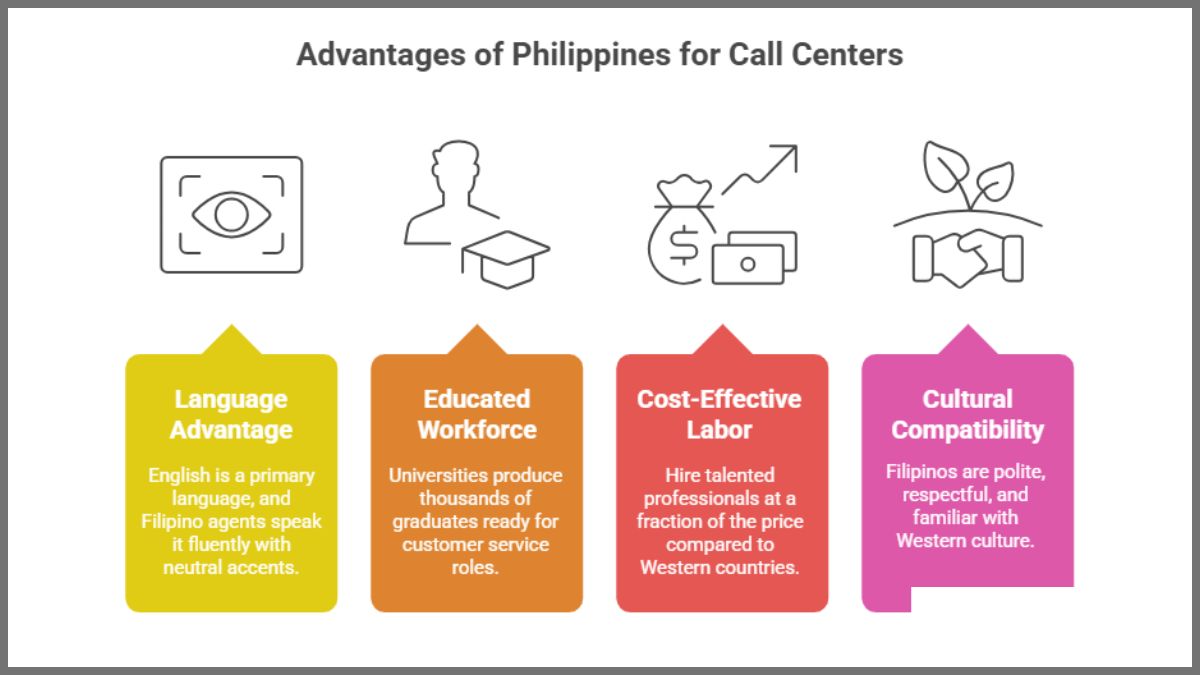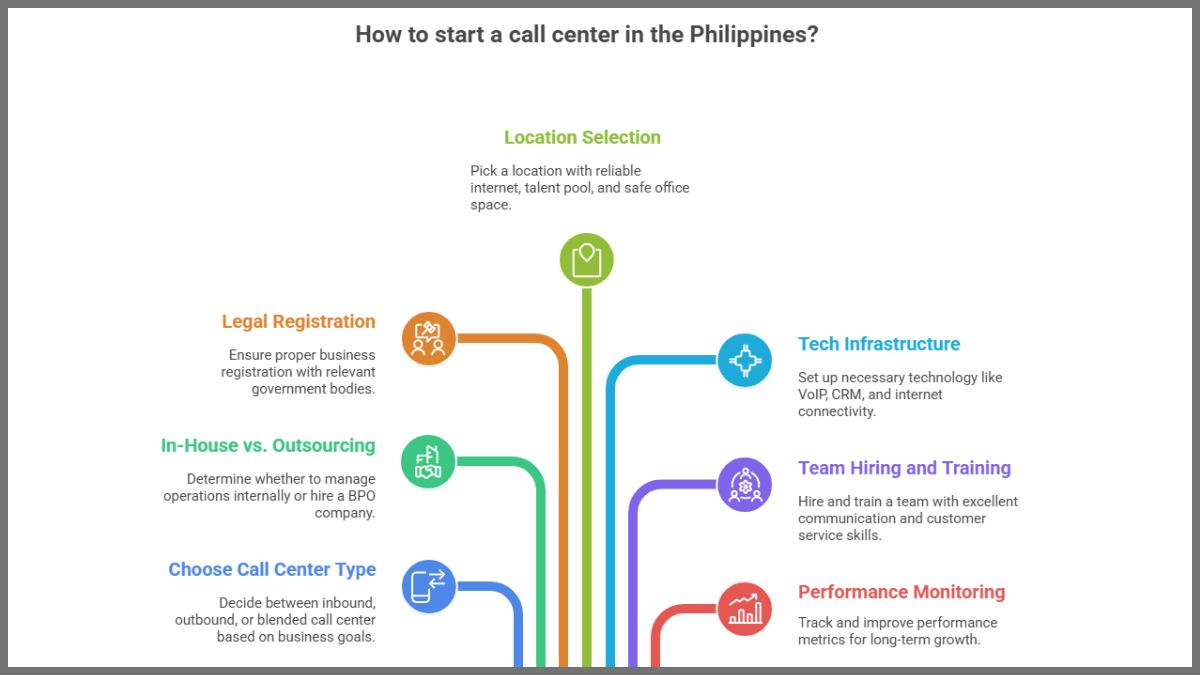Thinking of starting a call center in Philippines? You’re not alone. The country has become one of the top destinations for outsourcing customer service due to its skilled workforce, fluent English speakers, and cost-effective solutions. But how do you actually set up a call center in Philippines? Is it easy? What should you know before diving in?
Let’s break it all down in this easy-to-understand guide. Whether you’re a first-time entrepreneur or a business owner expanding your operations, this post covers everything you need to get started—without the confusing jargon.
Why Philippines Is a Hotspot for Call Centers
First, let’s talk about why Philippines is such a popular choice for outsourcing.
- Language Advantage: English is a primary language here, and Filipino agents usually speak it fluently—with neutral accents.
- Highly Educated Workforce: Universities in Philippines produce thousands of graduates each year, many of whom are ready to work in customer service roles.
- Cost-Effective Labor: You can hire talented professionals at a fraction of the price compared to Western countries.
- Cultural Compatibility: Filipinos are known for being polite, respectful, and familiar with Western culture, which helps in providing top-notch customer support.
Because of these advantages, big global players like Amazon, Google, and American Express have already set up shop in Philippines. Now, it’s your turn.
Want to see who else is leading the industry? Here’s a list of the top BPO companies in the Philippines.
Step-by-Step Guide to Starting a Call Center in Philippines
1. Decide on Your Call Center Type
Before jumping in, you need to know what kind of call center you want to build. Here are the most common types:
- Inbound Call Center: Handles incoming customer queries, support, or order taking.
- Outbound Call Center: Focuses on telemarketing, surveys, and sales calls.
- Blended Call Center: A mix of both inbound and outbound services.
Think about your business goals. For example, if you’re selling a product, an outbound or blended call center might be your best bet.
2. Choose Between In-House or Outsourcing
This is a big decision. Do you want to set up and manage everything yourself (in-house) or hire an existing BPO (business process outsourcing) company to handle it for you?
- In-house: Full control, more responsibility. You need to manage recruitment, training, operations, etc.
- Outsourcing: Less hassle. Many companies in Philippines offer full-service call center setups, so you can focus on your core business.
If it’s your first time, outsourcing might be the easier and safer route.
3. Register Your Business Legally
Yes, even if you’re running things from afar, your call center must be properly registered in Philippines. Here’s a quick list of government bodies involved:
- SEC (Securities and Exchange Commission): For business registration.
- BIR (Bureau of Internal Revenue): For tax identification numbers and permits.
- PEZA or BOI (optional): For tax incentives if you’re registering in an economic zone.
Pro tip: Partner with a local legal consultant to avoid red tape and delays. They know the ins and outs of the process.
4. Pick the Right Location
Next up—where will your call center be located? Metro Manila is the obvious choice, but other cities like Cebu, Davao, or Iloilo are also top-notch, offering lower costs and less competition.
You’ll want a location with:
- Reliable internet connectivity
- A large talent pool
- Safe and accessible office space
Tip: Renting space in a business process outsourcing (BPO) park gives you access to ready-made infrastructure like fiber internet and backup generators.
5. Build Your Tech Infrastructure
A call center lives and breathes through its technology. Here’s what you need to set up:
- VoIP Phone System: This will allow you to make internet-based calls, thereby saving the expense on international charges.
- CRM Software: Keeps customer data organized and accessible to agents.
- Workforce Management Tools: It helps monitor employee productivity, track shifts and manage schedules.
- Robust Internet Connection: This cannot be stressed enough. Without reliable internet, your call center won’t function.
Using cloud-based call center solutions can save money and offer more flexibility, especially if you’re planning to scale later.
6. Hire and Train Your Team
Your call center is only as good as the people running it. In Philippines, job seekers are often eager and qualified—but proper training makes all the difference.
When hiring, look for:
- Excellent communication skills
- Strong customer service mindset
- Experience handling calls (a big plus)
After hiring, invest in training. Teach your team about your product or service, customer handling techniques, and software tools. The more confident they are, the better your customer experience will be.
If you’re curious about how candidates usually apply for BPO jobs in the Philippines, check out this guide on how to apply for BPO jobs in the Philippines.
7. Monitor, Improve, and Grow
Launching the call center is just the beginning. The real success comes from ongoing management and improvement.
Regularly track performance through metrics like:
- Call resolution time
- Customer satisfaction score
- Agent performance reports
Use this data to make smarter decisions. Maybe you’ll need to tweak your training or deploy better tools. Either way, continuous improvement is the key to long-term growth.
Costs to Consider
Starting a call center in Philippines is more affordable than in many countries, but it’s still important to budget wisely. Here’s a rough breakdown:
- Office space rental – Cost varies by location
- Technology setup – Hardware, software, internet
- Salaries and benefits – Competitive packages attract better talent
- Legal and licensing fees – Registration, permits, etc.
- Training costs – Initial and ongoing training sessions
A small 10-seat setup can start with as little as $15,000–$20,000. For a larger operation, expect to invest more, especially in high-tech infrastructure and top-tier talent.
Final Thoughts: Is It Worth Starting a Call Center in Philippines?
Absolutely. Starting a call center in Philippines can be a wise, successful move for your company with the correct strategy. The nation is perfect for both major companies and little start-ups since it provides a distinctive blend of talent, affordability, and infrastructure.
Like any company, success comes not overnight; therefore keep this in mind. Begin humbly, construct with care, and pay attention to quality. Treat your personnel properly; they will return the favor by providing excellent service to your clients.
Then, are you ready to dive in? Your call center vision could quickly turn into a lucrative reality in one of the fastest-growing outsourcing centers in Asia with the right actions.






